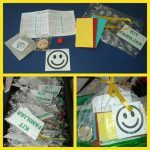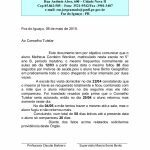The school year has begun and with it the messages for Parent-Teacher meetings that are essential both at this beginning and at the end of each stage. Each teacher must choose a text for this meeting that matches the reality of their work proposal (when the meeting is at the beginning of the school semester) or that identifies the overdue stage, the mistakes, the successes or even shows the parents what you want for the continuity of the work that is in development. To choose the text, the teacher has his own sensitivity to get it right. The approach of a good text can give parents assurance of the good professional in whom they trusted their greatest treasure – Their children!
Below I selected some nice texts that can be used successfully! Just organize and perfect the presentation.

autonomous children, happy children
Self-employed children, happy children. Parents raise their children autonomous when they teach them what needs to be done, in the way they believe is right, enabling them for life and not leaving them to their own devices. There is no need to worry about when to release them, as they will walk on their own legs to do everything they have been taught. When charging, check what was assimilated and complete with the guidelines that you think was missing. However, keep this in mind: The basis for developing autonomy is teaching your children the values you believe are right and establishing convenient rules. And also make clear what you expect from them. Parents capable of educating their children know how to give them responsibility, they know how far they can demand of them, and they demand neither more nor less than that; they do not go overboard or omit and have the authority to impose the necessary discipline. If you want to be a good father or a good mother, you must – and can – learn to do all of these. A couple is trained in the task of being a father and a mother through a lot of dialogue, a lot of interest, a lot of patience and determination. The result is always worth it. Parents must have authority. It is earned with respect, positioning, value and determination. Children recognize someone in authority and obey the voice of command. Leaving children free to do what they want makes them insecure, aimless, and unhappy. Otherwise there are those who guide and control them, children, in general, are lost, they don't know what to do. When this happens, the path is open that would possibly lead your children to become problem children. The bible says that our children are like arrows in the archer's hand. You need to know where to throw them, because if you throw them at random, without aiming, they'll end up anywhere, and usually never go where you'd like.
THE BUTTERFLY LESSON
One day, a small opening appeared in a cocoon. A man sat and watched the butterfly for several hours as it struggled to get its body through that small hole. Then it looked like she had stopped making any progress. It felt like she had gone as far as she could, and she couldn't go any further. The man decided to help the butterfly: he took a pair of scissors and cut the rest of the cocoon. The butterfly then came out easily. But her body was shriveled and small and her wings were crumpled. The man continued to watch the butterfly because he expected that, at any moment, its wings would open and stretch to be able to support the body that would assert itself in time. Nothing happened! In fact, the butterfly spent the rest of its life crawling around with a shriveled body and shriveled wings. She was never able to fly. What the man, in his kindness and willingness to help, did not understand was that the tight cocoon and the effort required for the butterfly to pass through the small opening it was the way God caused the butterfly's body fluid to go into her wings, so that she would be ready to fly once she was free of the cocoon. Sometimes effort is just what we need in our lives. If God would allow us to pass through our lives without any obstacles, he would leave us like the butterfly. We weren't going to be as strong as we could have been. We could never fly…May life be an eternal challenge, because only in this way will it really be possible to fly. (author unknown)
bright parents
-Cry with your children and hug them. This is more important than giving them fortunes or giving them mountains of criticism.
- Do not form heroes, but human beings who know their limits and their strength. - Make each tear an opportunity for growth.
– Encourage your child to have goals.
– Remember: talking is talking about the world around us.
– Dialogue is talking about the world we are.
– Hug, kiss, speak spontaneously.
– Telling stories.- Sowing ideas.
– Say no without fear.- Do not give in to blackmail.- Patience is needed to educate.
Augusto Cury
Dear Parents
Don't be afraid to be firm with me. I prefer it that way. This makes me feel more secure. Don't spoil me. I know I shouldn't have everything I want. I'm just experiencing you guys. Don't let me get into bad habits. I depend on you to know what is right or wrong. Do not correct me in anger or in the presence of strangers. I will learn a lot more if you speak calmly and privately. Don't protect me from the consequences of my actions. Sometimes I prefer to learn the roughest way. Don't take my little pains too seriously. I need them to get the attention I want. Don't be annoying when correcting me. If they do, I will be able to do it contrary to what they ask me to do. Don't make me promises you won't be able to keep later. Remember, this will leave me deeply disappointed. Do not test my honesty, but teach me to be truthful; for I am easily tempted to tell lies. Don't show me a sullen, vengeful God. This will take me away from him. Don't talk back when I ask questions, otherwise I'll look in the street for answers I didn't have at home. Don't show me the perfect and infallible people. I will be extremely shocked when I discover your mistake. Don't say my fears are silly, but yes, help me understand them. Don't say you can't control me. I will judge that I am stronger than you. Don't treat me like a person without a personality. Remember that I have my own way of being. Do not live pointing out the faults of the people around me. This would create in me, from an early age, an intolerant spirit. Don't forget that I like to experience things for myself. They don't want to teach me everything. Don't give up on teaching me good, even if I don't seem to be learning. In the future, you will see in me the fruit of what you sowed.
(Unknown author)
CHILDREN ARE LIKE SHIPS
As we look at a ship in port, we imagine that it is in its safest place, protected by a strong anchor. Little do we know that there it is in preparation, supply and provision to launch itself into the sea, the destination for which it was created, meeting its own adventures and risks. Depending on what the force of nature has in store for him, he may have to deviate from the route, trace other paths or look for other ports. It will certainly return strengthened by the acquired learning, further enriched by the different cultures traveled through. And there will be many people in the port, happy to wait for you. That's the way the CHILDREN are. These parents have their safe haven until they become independent. For more security, feelings of preservation and maintenance that they may feel with their parents, they were born to sail the seas of life, take their own risks and live their own adventures. Certain that they will take the examples of the parents, what they learned and the knowledge of the school – but the main provision, in addition to the material, will be inside of each one: THE CAPACITY TO BE HAPPY. We know, however, that there is no ready-made happiness, something that is kept in a hiding place to be donated, transmitted to somebody. The safest place the ship can be is in the port. But he was not meant to stay there. Parents also think it is a safe haven for their children, but they cannot forget the duty of preparing them to sail at sea. inside and find their own place, where they feel safe, certain that they will have to be, in another time, that port for others beings. Nobody can trace the children's destiny, but they must be aware that, in their luggage, they must carry inherited VALUES, such as HUMILITY, HUMANITY, HONESTY, DISCIPLINE, GRATITUDE AND GENEROSITY. Children are born from their parents, but they must become CITIZENS OF THE WORLD. Parents may want their children to smile, but they cannot smile for them. They can wish and contribute to their children's happiness, but they cannot be happy for them. HAPPINESS CONSISTS IN HAVING AN IDEAL AND IN THE CERTAINTY OF TAKING FIRM STEPS IN THE PATH OF THE SEARCH. Parents should not follow in their children's footsteps. nor are these to rest in what the fathers have achieved. Children must follow where their parents arrived, from their port, and, like ships, set out on their own conquests and adventures. But, for that, they need to be prepared and loved, in the certainty that “WHO LOVERS EDUCATES.” “HOW IT'S DIFFICULT TO LOOSE THE MOORINGS”
(Içami Tiba)
FATHER AND MOTHER…
– Cry with your children and hug them.
This is more important than giving them fortunes or giving them mountains of criticism.
– Do not form heroes, but human beings who know their limits and their strength.
– Make each tear an opportunity for growth.
– Encourage your child to have goals.
– Remember: talking is talking about the world around us.
– Dialogue is talking about the world we are.
– Hug, kiss, speak spontaneously.
- Tell stories.
– Sowing ideas.
– Say no without fear.
– Do not give in to blackmail.
– To educate you need patience.
Augusto Cury
The educational role of parents
Raising a child is not simply focusing on the affective area; it is also about introducing him to life, helping him to adapt to the demands of practical life and allowing him to develop his social life. It is to transmit a name, a lineage, a cultural and educational heritage: behaviors, references, ideas, a system of values.
It is also to encourage their experiences, stimulate their curiosity to know and act, develop their critical sense and help them in their responsibilities; help him to have respect for himself and for others, learning to master his spontaneous aggression, always being able to defend himself and fight against the difficulties of existence.
For this, nothing better than the example of your parents, your grandparents and other people around you.
Parents transmit to their children everything they know, what they learned from their parents and what they most they then consider letting them, growing up, find their own centers of interest and their own values. It can be said that the parents were successful in bringing up their child when they managed to teach him to live without them. It is not good for parents to be too focused on their children's education, aspiring to make perfect young people. It is suffocating for both the children and the parents themselves.
Satisfying their personal aspirations, parents urge their children to fulfill theirs. this is to set an example of the pleasure of living!
Another important element is the parent-child relationship that is established through communication, whether verbal or not.
Let us remember that dialogue is the privileged instrument. Crises and misunderstandings are always tied around the unsaid and misunderstandings.
Another essential point is the parents' agreement on the basic educational principles, whether they live together or not. Many differences, ideological or moral, leave the young person divided, as he cannot help but take sides. The condemnation or devaluation of one of the parents provokes a rupture in identification, a feeling of guilt and anguish that leads the young person to regress or block his development. but if one contests the other's decisions, the young person will go through the experience of differences in ideas, positions and the distinction between the roles of each, which is very structuring.
As he does with authority, the young man also tests this alliance, and puts to the educational test of his parents and, at times, he makes the discord a test of the psychic solidity of everyone. Often the young person is also tempted to create a coalition with one parent against the other. This is unconscious to ambivalent. He seeks this alliance and fears it at the same time, because if it comes to fruition, it is very distressing. It can happen that parents argue and fight, which is worse. The important thing, in these cases, is this truth, to say with your words what you feel, because it is our frankness that the young person is most in need.
Calire Garbar and Francis Theodore – Mosaic Family
Educating children for their lives.
It would be great if the autonomy of children is a natural process and happens over time. But we know that it depends on parents' education, potency and courage.
At each stage of development the child acquires a skill until he masters several. It is up to the family to encourage the process that occurs through hits and misses. This goes for taking off a diaper, walking, eating, storing toys, doing schoolwork, drinking alone, etc. Each accomplished step nurtures self-confidence, which we see for example when the 2-year-old tries to get dressed, and at the age of 3, he hardly needs any help, then parents should celebrate these achievements and not abandon supervision. Sleeping is another challenge, as fears appear at night and most ask for the company of their parents or jump into their beds, so it's worth establishing affective routines, combine the number of stories to be counted, the important thing is that they get used to sleeping alone, which will make her in adolescence able to regulate the rest.
Autonomy is a process that is built gradually and parents are often not aware of it, as the lack of autonomy affects adolescence where problems arise and it is not related to the fact that we did the lessons for them, too protected, as when the child doesn't want to wake up early and the mother dresses him and only wakes him up close to school so he could sleep a little longer.
Such facts impede autonomous growth and surreptitiously send the message that it can do what it wants. So we have annoying, irritable and dependent children. Education aimed at autonomy does not mean general freedom, freedom is also learned. The notion of limit is as necessary as affection. Because if the child associates that he loved to hear the yes all the time, he will reproduce this pattern in the future reacting negatively to any “no” received and will not acquire the necessary flexibility to negotiations. Thus your ability to make the right decisions will be affected, which will make it difficult, for example: to make a diet or refuse drugs, as he never experienced childhood frustrations, nor did he accept negative requests.
To phrase the author Aratangy, “the illusion that the child is ours is undone every day and in adolescence, it ends for good. So it's better to educate them for life”. Theirs.
Collaboration: Maria Gladys Ricardi Vera – Psychologist
Spanking teaches?
Do parents still question whether it is valid to spank to teach a child to respect boundaries? I have no doubt: spankings teach. But not exactly what parents want.
A child who is beaten learns to be: aggressive, because he realizes that hitting the other is a way to solve a problem; cynical, as it develops the ability not to feel humiliated; liar, because she learns that certain behaviors cause pain and lying can free her from confrontation; cowardly, for escape is your only chance of victory.
Another disadvantage of this pedagogical method is that it is based on the physical superiority of the parents – and that is the female. As the children grow every day and the parents have stopped growing, it would be necessary, to maintain the same advantage, to appeal to increasingly heavier accessories, from hand to slipper, from broomstick to broomstick, and so on. against.
Furthermore, the slap pedagogy creates nefarious by-products. Here are some examples:
1) "You'll see when your father arrives!" – With this phrase, the mother poisons the bond between father and son and demoralizes herself, as she reveals herself to be dependent on the strength of her partner.
2) "Don't hit your brother because he's smaller than you!" – The declaration, accompanied by loud taps on the aggressor brother, is the most blatant denial of logic, the adult who beats is no bigger than the child who catch?
3) "This hurts me more than it hurts you!" – No child has the resources to understand what this adult expects of her. Does the adult want her to feel guilty for the pain she causes her mother?
4) “A well given slap teaches more than a thousand words…” – Even if it is possible to define “a well given slap”, no slap teaches more than a single (un)word spoken with serenity and conviction.
4) "One day, you'll still be grateful for those spankings!" - Does anyone believe that he became better for being slapped? There is no need to hold grudges for the slaps you receive, but thanking you is too much! Nobody, in their right mind, believes that spanking teaches children to be generous, dignified, loyal or trusting. And there are no more important values than these.
It happens in the best families. Slapping a child with whom you have a solid bond of affection and trust is not a mortal sin. After all, parents are human. Sometimes life demands too much, not always the most appropriate behavior. This slap that crackles without one's knowing exactly where it came from, as if the hand took on a life of its own and left without command, conveys a fundamental piece of information: that parents are not perfect, they are mortals who do what they can, not what want.
The important thing is to recognize that a slap always emanates from a weakness, from the impossibility of controlling oneself and maintaining dialogue. Sin is the hypocrisy of turning this difficulty into a Pedagogy thesis.
Lidia R.Aratangy – Viver Magazine – January 2002.
About Homework: talking to parents
For many parents, the timing of their children's homework can raise some questions, such as:
With this in mind, we decided to present this summary for clarification and understanding of the goals and role of parents in relation to the subject.
The practice of performing homework, according to the type of lesson, is intended to promote situations for the student:
The family
Homework allows the family to share part of the knowledge that their children build throughout their work. Showing interest in the child's school life marks, in the student's education, the importance that the family attaches to studies.
In relation to homework, it is noteworthy that the student must perform this task alone. The College is always careful to plan activities in which it can work independently, in addition to a time reserved in the school routine for the presentation and explanation of the proposed task to be done at home.
Parents must monitor the performance of homework at the time of completion, or set aside a daily or weekly time to:
check whether the lesson was carried out or not, reinforcing the attitude of compliance with responsibility;
observe whether it is well done or not (whim, organization, cleanliness, etc.);
praise, motivate and encourage their effort and achievement, talking about successes and mistakes.
General guidelines for the good development in carrying out the activity at home.
Should parents or not help their children with their homework?
The interest, participation and help that enable the child to work more and more autonomously are always welcome!
The 10 Commandments of Homework
1 – Never do your child's homework or allow others to do it (grandparents, maid, older brother, friend). Be clear that the lesson is your child's and not yours, so he has a commitment and not you. Let him do his homework and go do something of your own. He needs to feel that the timing of the task is his.
2 – Organize an appropriate space and time for him to do his tasks.
3 – Exchange ideas or ask questions to help with thinking, but only if requested. Don't give answers, ask questions, provoke reasoning.
5- Always be regulated with the study time, remembering: quantity is not quality;
4 – Say “try again” on the complaint. Redo. Start over. If your child realizes he was wrong, encourage him to look for the right answer or a new answer. Demonstrate with examples that you often do this. in this case, the previous items are valid to reinforce this one.
6 – Make the error constructive. Making mistakes is part of the process of learning (and living!). Talk, emphasizing the importance of recognizing our mistakes and learning from them. Tell stories that are related to misunderstandings.
7 – Remember that two stages are part of school assignments: lessons and study to review the contents. School responsibilities do not end when the student finishes homework. Deepening and reviewing the contents is essential.
8 – Don't mix things up. Lesson and studying are school-related tasks. Washing dishes, tidying the room, and storing toys are all household chores. the two are works, however, of different natures. Don't link one job to another, and only assess household obligations.
9 – Don't judge the nature, difficulty or relevance of homework. Homework is part of a process that started in the classroom and should end there. If you don't understand or don't agree, go to the school and find out. Your judgment can demotivate your child and even disqualify the teacher and, consequently, the homework and goals.
10 – Show that you trust your child, respect their initiatives and their limits, and know their possibilities. create a climate of camaraderie and awareness in the family, but be sure to set limits and be strict with relapses and irresponsibility.
Isabel Cristina Parolin, author of the book Pais Educadores – É Proibido Proibir? Ed. Mediation.
The Ten Commandments of the Father of the Good Student
There are some basic rules for you who want to see your child become a good student, who don't give him bigger problems (because some, small ones, we'll always have!) in relation to school and studies. The father of the good student:
Did you like it? Share this post on your social network
 FAMILY KIT FOR PARENTS' REUNION
FAMILY KIT FOR PARENTS' REUNION
 AGENDA FOR PARENTS MEETING
AGENDA FOR PARENTS MEETING
 Message for Pedagogical Meeting with Teachers
Message for Pedagogical Meeting with Teachers
 ACTIVITIES ABOUT CITIZENSHIP
ACTIVITIES ABOUT CITIZENSHIP
 ACTIVITIES ON DIRECT AND INDIRECT SPEECH
ACTIVITIES ON DIRECT AND INDIRECT SPEECH
 Undisciplined Student Report to the Guardianship Council
Undisciplined Student Report to the Guardianship Council
This site uses Akismet to reduce spam. Learn how your comment data is processed.